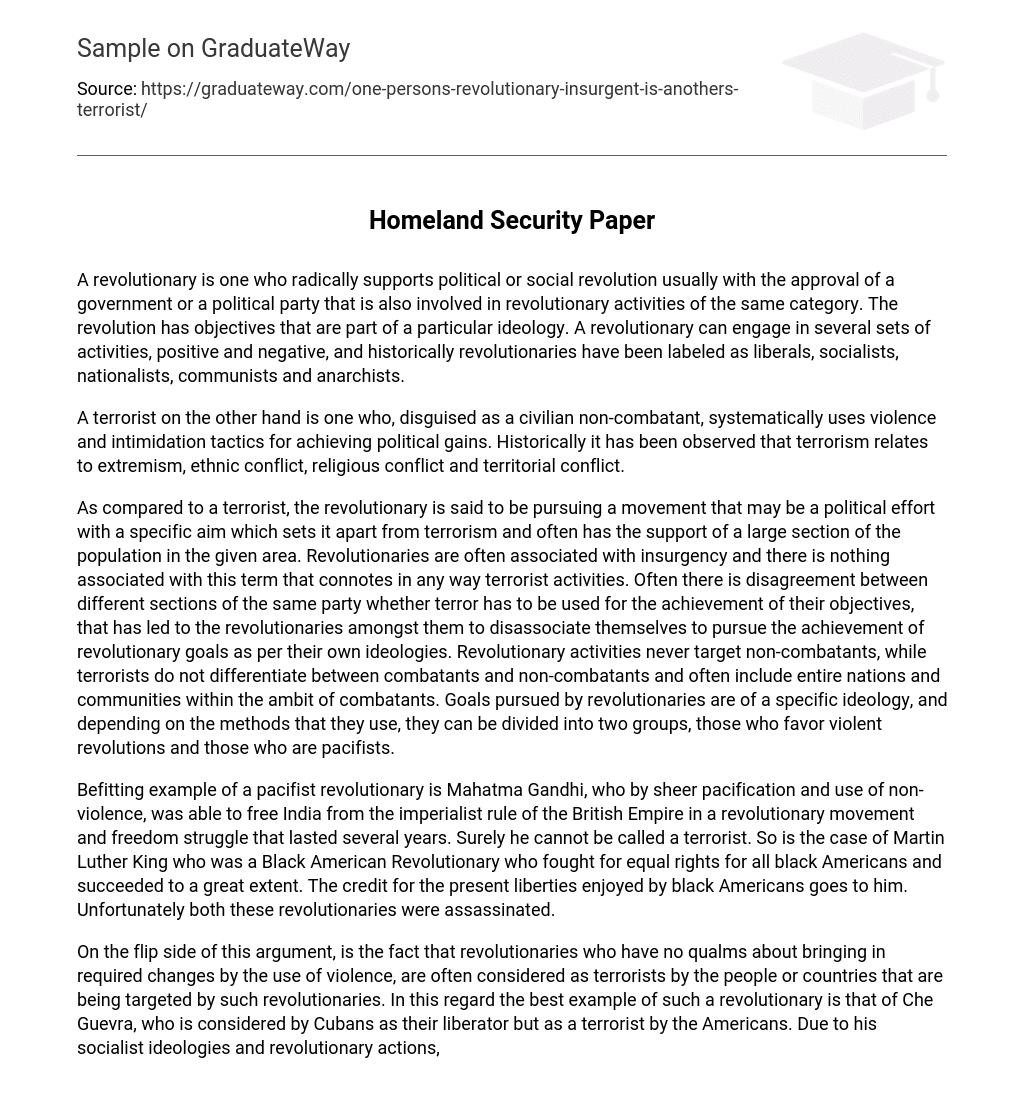A revolutionary is one who radically supports political or social revolution usually with the approval of a government or a political party that is also involved in revolutionary activities of the same category. The revolution has objectives that are part of a particular ideology. A revolutionary can engage in several sets of activities, positive and negative, and historically revolutionaries have been labeled as liberals, socialists, nationalists, communists and anarchists.
A terrorist on the other hand is one who, disguised as a civilian non-combatant, systematically uses violence and intimidation tactics for achieving political gains. Historically it has been observed that terrorism relates to extremism, ethnic conflict, religious conflict and territorial conflict.
As compared to a terrorist, the revolutionary is said to be pursuing a movement that may be a political effort with a specific aim which sets it apart from terrorism and often has the support of a large section of the population in the given area. Revolutionaries are often associated with insurgency and there is nothing associated with this term that connotes in any way terrorist activities. Often there is disagreement between different sections of the same party whether terror has to be used for the achievement of their objectives, that has led to the revolutionaries amongst them to disassociate themselves to pursue the achievement of revolutionary goals as per their own ideologies. Revolutionary activities never target non-combatants, while terrorists do not differentiate between combatants and non-combatants and often include entire nations and communities within the ambit of combatants. Goals pursued by revolutionaries are of a specific ideology, and depending on the methods that they use, they can be divided into two groups, those who favor violent revolutions and those who are pacifists.
Befitting example of a pacifist revolutionary is Mahatma Gandhi, who by sheer pacification and use of non-violence, was able to free India from the imperialist rule of the British Empire in a revolutionary movement and freedom struggle that lasted several years. Surely he cannot be called a terrorist. So is the case of Martin Luther King who was a Black American Revolutionary who fought for equal rights for all black Americans and succeeded to a great extent. The credit for the present liberties enjoyed by black Americans goes to him. Unfortunately both these revolutionaries were assassinated.
On the flip side of this argument, is the fact that revolutionaries who have no qualms about bringing in required changes by the use of violence, are often considered as terrorists by the people or countries that are being targeted by such revolutionaries. In this regard the best example of such a revolutionary is that of Che Guevra, who is considered by Cubans as their liberator but as a terrorist by the Americans. Due to his socialist ideologies and revolutionary actions, he was the most wanted enemy of America and the capitalist countries, was captured, tried and finally executed by them. There is a specific case of an Indian Airlines plane being hijacked to Afghanistan and the hijackers demanded that three of their leaders lodged in Indian jails be freed or else they would blow up the plane with all passengers. Reluctantly the Indian government complied with their demand and the prisoners were freed. Sure, for the Indians, these hijackers were terrorists but for the radical group on whose behalf the passengers were taken hostage, the hijackers were revolutionaries fighting for the cause of the liberation of Kashmir. Similarly the Taliban, who are ferociously indulging in terror activities in Pakistan are labeled as terrorists by the entire world, but they are heroes and revolutionaries for most Afghans as such terrorist activities, are understood by them as being revolutionary in nature and for a cause.
References
- Benjamin Haspel, Rebecca Rottinger, Terrorist or Revolutionary Hero, http://www.acs-onweb.de/hd/content/pres_c5/section
- Differences between Terrorism and Insurgency, 2003 http://www.terrorism-research.com/insurgency/
- Ted Goertzel, Ethics of Terrorism, 1988, http://crab.rutgers.edu/~goertzel/terrorandrevolution.htm





